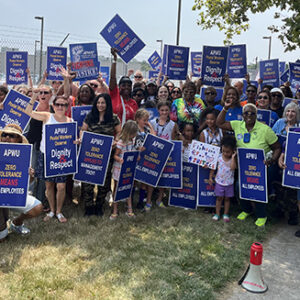February 3, 2005
Arbitrator Rules for Union In Major Attendance Case
An arbitrator has sustained the APWU’s arguments in two of three outstanding issues in a significant attendance case. In a ruling in late January, Arbitrator Shyam Das said that the Postal Service may not require an employee to describe the nature of an illness or injury during a phone call to report an absence from work. He also ruled that the USPS policy on second and third medical opinions is inconsistent with the Family & Medical Leave Act and the National Agreement.
The arbitrator found that management is not in violation of the FMLA, however, when it requires medical evidence for absences of more than three days in instances in which an employee makes a request to substitute paid sick leave for unpaid intermittent FMLA leave.
The disputes concern the Postal Service’s Resource Management Database (RMD) and its Web-based Enterprise Resource Management System (eRMS) attendance policy, which was first implemented in 2000. In a national pre-arbitration settlement in March 2003, the Postal Service and the APWU reached an agreement that resolved most of the disputes regarding the policy.
That settlement addressed Privacy Act issues, the improper retention of disciplinary records, multiple call-in requirements, medical documentation for absences of three days or less, and fixed numbers of absences triggering discipline. An arbitration hearing was held on the three outstanding issues.
The union contended that requiring employees to disclose the nature of their illness or injury was inconsistent with the Employee & Labor Relations Manual (ELM), unnecessarily intrusive into employee privacy, and not needed for any legitimate business purpose. The arbitrator agreed.
Arbitrator Das ruled that the primary purpose of the call-in is not to substantiate the employee’s incapacity to work, but to notify the Postal Service as soon as possible that the employee is going to be absent. Another major purpose, he wrote, is to determine whether the absence may be covered by FMLA. To accomplish this goal, the supervisor can simply ask whether the leave request is for a new or existing FMLA condition, or can describe in general what constitutes an FMLA-covered condition and ask the employee if the leave is related to one of these conditions. The person answering the call-in may not otherwise require employees to describe the nature of their illness, the arbitrator ruled.
The Postal Service’s procedure regarding second and third medical opinions also violates the FMLA and the National Agreement, Arbitrator Das wrote. The second and third opinions come into play when management questions the validity of an employee’s medical certification.
There is no justification for equating an employee’s failure to request a third opinion with the employee’s acceptance of the second opinion as binding, Arbitrator Das concluded. The arbitrator directed the USPS to rescind the disputed policy.
“These rulings represent an important victory for APWU members,” said Industrial Relations Director Greg Bell. For more information on the case and a copy of the award, click here.
‘Lift Gates’ Could Post Serious Danger
The APWU is aggressively pursuing reports of major safety problems with Leyman lift gates on many recently deployed postal trucks. Two-hundred-forty trucks equipped with these lift gates have been taken out of service.
In San Francisco, a malfunctioning lift gate caused a loading-dock accident in November. Hydraulic-system failure led to a lift-gate collapse, dropping a driver five feet to the ground. Fortunately, a container of mail he was unloading got wedged between the loading dock and the lift gate, allowing him to avoid serious injury.
In other cases, defective welds have been found in “tuck-under”lift gates. “These incidents demonstrate the potential for serious injury or death, and we are vigorously pursuing this matter with the Postal Service,” said Motor Vehicle Craft Director Robert Pritchard.
In January, Leyman began replacing the “C” valve on the rail-style lift gates on some of the trucks and supplying special support brackets for others. USPS officials at the local level have been directed to test vehicles using the Leyman rail-type lift gates, and to keep motor vehicle operators informed about the safety issues.
“We believe the tests may be inadequate and should not be relied upon to identify and correct the problems and ensure the safety of our members,” Pritchard said. “We believe all trucks with the Leyman lift gates should be retrofitted or repaired.”



